The youth climate movement gained strength in 2018, driven by Swedish activist Greta Thunberg, who began skipping school every Friday to protest outside the Swedish Parliament. Her actions demanded stronger responses to the climate crisis and quickly gave rise to Fridays for Future, an international mobilization for urgent and systemic climate action.
In 2022, Pakistani activist Ayisha Siddiqa captured international attention during a speech at Climate Week in New York, when she declared: “to hell with your sustainability, my people are dying”. She was referring to one of the most extreme climate events in Pakistan’s history, a flood that had occurred just months earlier, affecting 33 million people, displacing nearly 8 million, leaving more than 1,700 dead, and submerging one-third of the country.
In this interview with SUMAÚMA, Siddiqa discusses the fractures and contradictions within Fridays for Future caused by the movement’s stance on the genocide in Gaza. In May, she made public her dissatisfaction with a post by German activist Luisa Neubauer* on the subject, demanding an apology for the involvement of Fridays for Future Germany in decisions that, according to her, sought to depoliticize the connection between the climate crisis and Israel’s invasion of Palestine.
At the end of October 2023, Greta Thunberg and Fridays for Future International expressed solidarity with Palestine, calling the Israeli offensive a genocide. In response, Fridays for Future Germany publicly stated that this position did not represent the local group. In statements to the German press, its spokesperson, Luisa Neubauer—one of the leading figures in European climate activism—acknowledged the differing opinions on Israel and Palestine within Fridays for Future, but emphasized this did not justify antisemitism or the spread of misinformation. Neubauer stated that she did not consider it productive for the movement to place itself at the center of crises that go beyond environmental issues.
Israel’s genocide in Gaza has killed more than 62,000 people and injured another 130,000, with countless others buried under rubble. Over 80% of agricultural land has been destroyed, the soil contaminated with toxic heavy metals, and the territory’s infrastructure severely damaged. A study published in May revealed that greenhouse gas emissions generated during the first 15 months of the war exceeded the annual emissions of the 41 lowest-emitting countries, highlighting the urgent need for greater transparency and mandatory reporting of military emissions under the United Nations Framework Convention on Climate Change (UNFCCC).
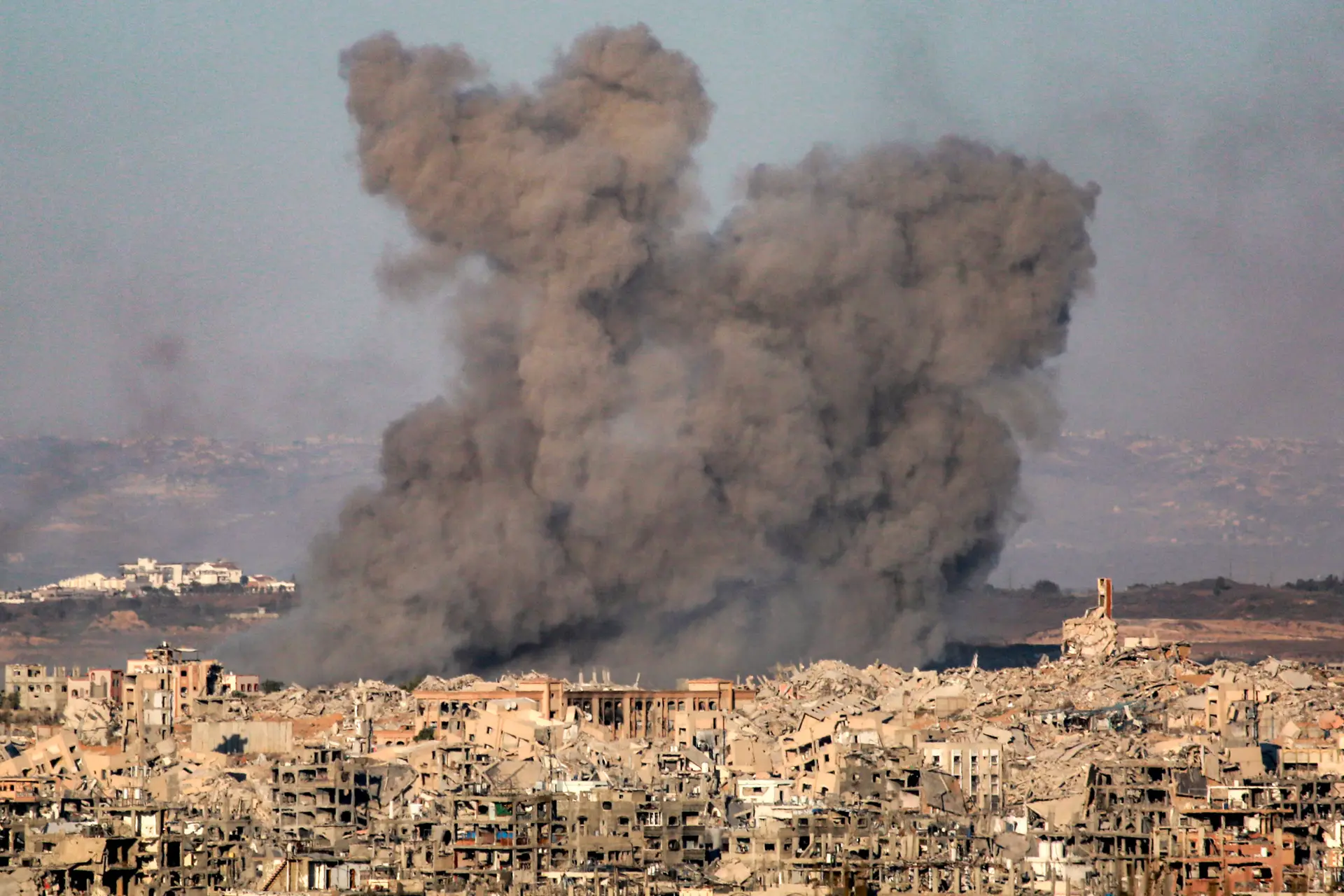
Smoke rises over Beit Lahia, in northern Gaza, after an Israeli airstrike in July 2025. Photo: Bashar Taleb/AFP
Siddiqa describes the current moment as both shocking and beautiful, highlighting Greta Thunberg’s bravery in joining the Freedom Flotilla Coalition, which was aiming to break the sea blockade of Gaza and deliver humanitarian aid to Palestinians. “If you believe in climate change, you believe in preserving humanity, and you will do everything necessary because you understand the urgency of what’s at stake. Greta Thunberg believes in climate change. That is why she was on that ship that could be bombed.”
Now 26, she is pursuing her Juris Doctor (J.D.) at UCLA School of Law and devoting her time to the Future Generations Tribunal, a people’s court working to establish and embed legal recognition of the rights of future generations in international climate law, where she serves as Executive Director. Born in Jhang, in northern Pakistan, she belongs to the Moochiwala and Mahsan tribal communities and moved to the United States when she was a child. The profound impacts of conflicts and colonization on Pakistan’s stability and environment shaped her political and environmental awareness. “The wars in Iraq and Afghanistan severely affected Pakistan,” she explains. “They served as a justification for military presence in the country. Many of the natural resources are controlled by the military; waterways and large land areas belong to them. If you protest, that is the very entity you come up against.”
Diagnosed with a terminal illness at 14, she found healing in nature and in the knowledge of her ancestors. Her activism is unique, marked not only by its forcefulness, but also by her spirituality and poetry.
Ayisha spoke with SUMAÚMA shortly before traveling to Guam, an island in Micronesia, where she spent some time with the team at Blue Ocean Law, a law firm specializing in human rights—particularly Indigenous rights—and environmental justice.
There is a growing intersection between the climate crisis and the geopolitical crises. How has this been reflected within Fridays For Future? How has the genocide in Gaza impacted the movement?
AYISHA SIDDIQA: As for Gaza, I was absolutely baffled by the lack of response in the movement as a whole. Fridays for Future (FFF) movement had its biggest chapter in Germany, and the German movement had an active role in trying to depoliticize the issues of Palestine and the climate crisis back in 2021. FFF had the opportunity to say something about the West Bank being occupied. We tried, and internally there was a conflict. That conflict has been one of the massive reasons why this movement has fizzled.
How can you talk about the fact that after so many people in the Amazon in Brazil were killed, then you can suggest it’s a genocide, yet while it’s happening, nobody stands up to [Jair] Bolsonaro, just like nobody is standing up to [Benjamin] Netanyahu or [Donald] Trump, because they’re too scared?
I was at NYU, at the Center for Human Rights and Global Justice, and they were working a lot with citizens of the Amazon all over the world, the Ecuadorian Amazon, the Colombian Amazon, the Brazilian Amazon, but I was told not to talk about Palestine. And as a person from the Middle East, that was shocking to me.
In 2019, people were shocked at the bravery of Greta Thunberg because there was a little girl in front of her institution protesting climate change. Now, she was on a ship to one of the most dangerous places on Earth. That is climate justice to me. That is what an activist is supposed to be.
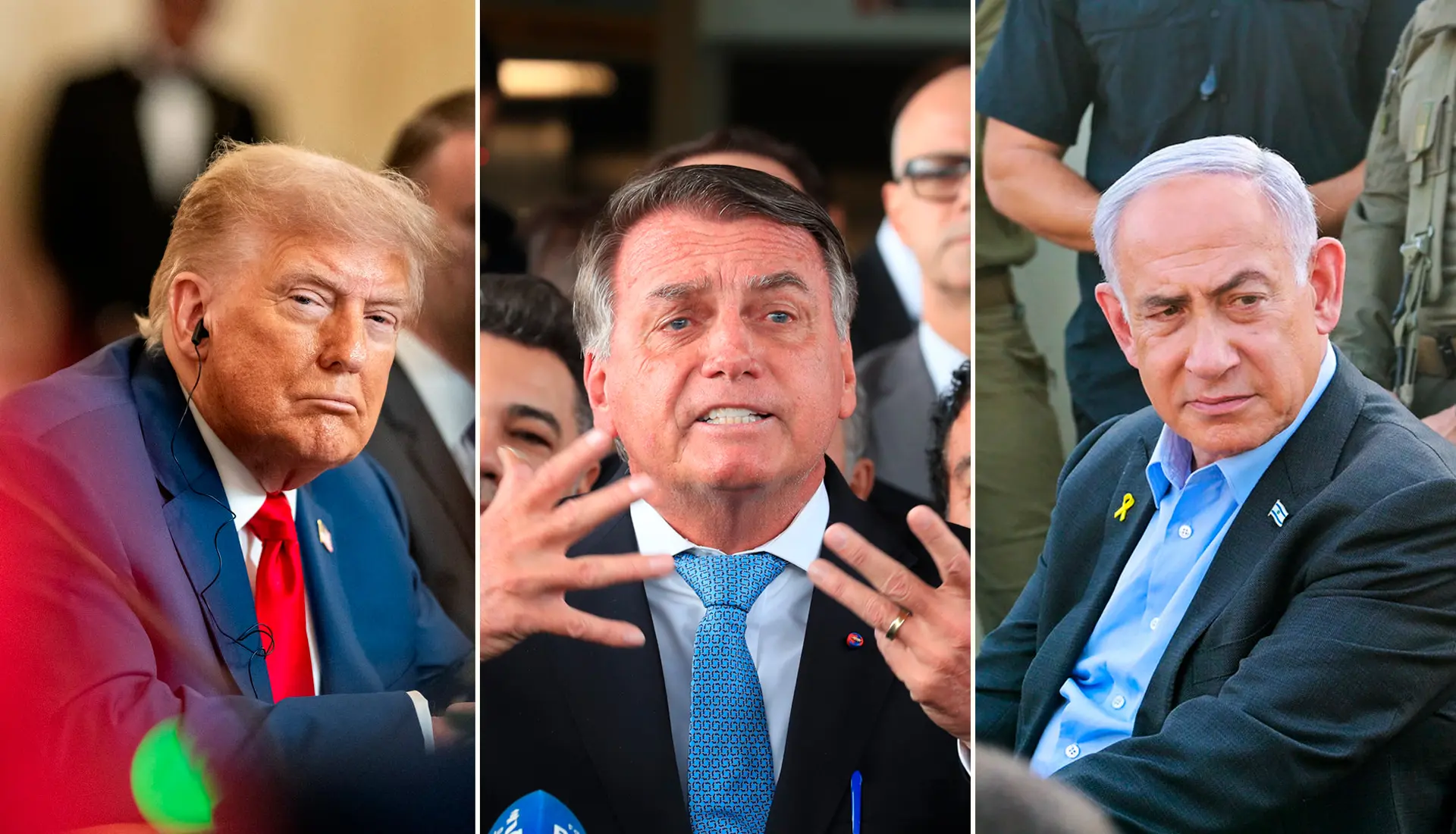
Trump, Bolsonaro, and Netanyahu, far-right extremists who undermine efforts to combat the climate crisis and peace. Photos: Daniel Torok/White House, Lula Marques/Agência Brasil, and Kobi Gideon/CEO
In May, you asked on social media that German activist Luisa Neubauer publicly apologize for not standing with the Palestinian people. What motivated you to ask that? Has she responded or apologized since then?
I’ve been keeping this in me for years. There are people in this movement who are just purely there for politics, and I think that’s OK. Martin Luther King worked more with white people; Malcolm X focused on Black solidarity. I follow Malcolm X. These are my political references.
What makes me uncomfortable is when someone feeds the status quo to build their profile, performing subversion, following John Kerry [ex-United States Special Presidential Envoy for Climate] around with a camera, asking complicated questions, getting 100,000 views, pretending to push but not really pushing. That makes me deeply uncomfortable.
Inside the movement, Luisa’s presence was harmful. She was directly involved in FFF Germany’s stance that labeled others as antisemitic. FFF said on Twitter that the FFF MAPA (Most Affected People and Areas) movement, and BIPOC (Black, Indigenous, and People of Color) were being antisemitic for suggesting that Israel was committing a genocide.
By doing that, the media turned on Greta. It became so unsafe for us to be there, for Greta to be in the country. Authorities sent police with batons to the protests, beating some of my colleagues for their involvement in demonstrations. We used to fly the Palestinian flag in 2019. We couldn’t do that anymore.
Luisa also carries a lot of privilege, which is not necessarily a bad thing. But It’s very different from becoming the local celebrity of your country and becoming the face of the movement and being so disconnected from it. Luisa doesn’t have a good relationship with most of the people in Friday’s for Future, yet she is repeatedly put on stage because she’s the darling of the media. It may seem odd for someone like me to say that, since I’ve also appeared in Time, The New York Times, and so on [Ayisha was recognized by Time as one of the Women of the Year in 2023 and included in the first edition of The Independent’s Climate 100 List in 2024]. The difference is that I truly come from the movement, I seek the approval of those within it, and at the end of the day, my politics align with theirs—the pursuit of a new world.
I understand Germany’s historical responsibility and guilt from World War II. But an activist isn’t someone who gets the most views. An activist has a moral conscience that cannot be moved. Over time, Luisa has acquired money. That’s something we need to think about critically.
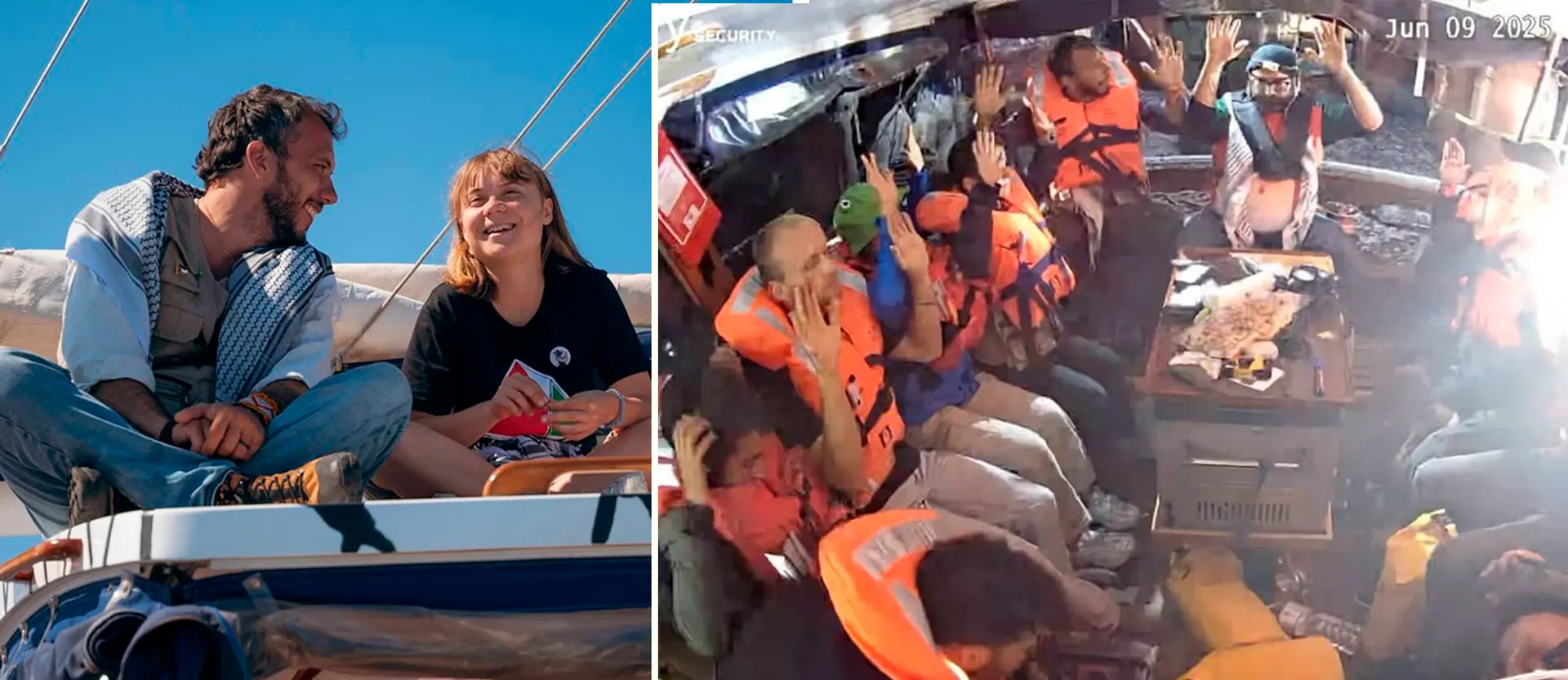
Thiago Ávila, Greta Thunberg, and the crew aboard the Freedom Flotilla Coalition boat on a mission to Gaza in June 2025. Photos: Instagram/Reproduction
How critically?
Why are we obsessed with taking teenagers, putting them on TV, giving them book deals, making them rich, and surrounding them with security? Why does an activist [who becomes a celebrity] even need security? And why are those meant to challenge the status quo becoming part of it?
I find moral clarity lacking in the activists around me, the mainstream ones, the ones who end up on stage. I feel their sacrifice or bravery is conditioned on how much they’ll get out of it. It’s a blanket statement, maybe not true, maybe a negative take, but it’s what I see and notice.
If I’m on stage and Hillary Clinton is on stage, she should be uncomfortable. I’m not her puppet. The moment injustice happens, it’s your responsibility to speak up, especially when you have media, followers, a platform.
What are your current reflections on the global youth climate movement?
You take on a responsibility toward the media and your followers. You can’t be an activist and remain silent. That’s a disservice to activism, and it frustrates me deeply.
What an activist is supposed to be? It’s not supposed to be getting on media and selling products, which I think has been the reduction of the movement as well, because the main audience on so many platforms is young people. So in order to communicate to young people, people start using those platforms. And as you do, you depoliticize yourself and fall into the capital market of “me.” I’m a product. I need views because I’m going to make money. Or: “I’m going to tell you about the sustainable shampoo and want you to buy it.” I say what’s more palatable , so I get invited on stage again.
I also reject this model of climate entrepreneurship. What do you mean you’re selling second-hand clothes for $600? How is that activism? Why is Sophia Kianni [Iranian‑American climate activist and social entrepreneur] working with Kim Kardashian? What even is that? That is not climate activism. And the fact that this has been normalized is disgusting to me.
For my colleagues and I, who truly understand the urgency and carry a heavy weight on our shoulders., it’s all-consuming. The reports, the analyses, they’ve aged me so much. I’ve spent time with Indigenous peoples and seen the forests dying. It hurts. I’ve been with communities around the world, including the Maasai in Kenya. I’ve seen it firsthand. I’m going to be in Guam this summer. I know some of my family members are enduring 40 to 50°C heat in Pakistan. When you truly understand all of this, the responsibility shifts, and it becomes almost impossible to fully process.
And as politics around the world become more conservative, people in the climate movement have also become more conservative. We’re not just seeing this here in the United States; it’s happening in Italy, in Germany, and in France. There’s been a new rise of fascism, and with this new rise of fascism, you’re seeing less subversion.
How was your experience as an advisor of the United Nations General Secretary António Guterres? What did you learn about the UN system?
Something I’m proud of is that I was advising the Secretary-General on human rights and the rights of future generations, and started digging deeper into this topic.
At the moment, there is an advisory proceeding before the International Court of Justice (ICJ) regarding the recognition of climate change as a human rights issue. They will release their opinion in this month, in June, hopefully [On July 23, the International Court of Justice declared that climate change constitutes an urgent and existential threat, establishing that states have a legal obligation to protect the climate system, prevent significant environmental harm, and cooperate in its mitigation]. There are two questions in front of the court. What are state’s obligations per human rights to climate change and what are state’s obligations to future generations.
The court has significantly expanded on the first question, states’ obligations under human rights law, and I believe we’re going to see a strong opinion in that regard, which could shift the landscape a bit. However, I don’t believe they will expand on the rights of future generations.
With the shifts in global politics and in how we perceive the climate crisis, after COVID, the war in Ukraine, and now Palestine, climate change has taken a back seat and the idea of rights of future generations has become highly contested.
Many countries, especially in the Global North, resist this idea because it exposes a dual responsibility: on one hand, historical responsibility, and on the other, responsibility toward future generations. And that puts pressure on them. Moreover, future generations are not just human beings, they include the future generations of animal species, of the living world, of the forests.
That’s why I began working on the idea of a tribunal. We have a lot of theory. We have a very limited source of evidence of the harms that are being committed.
I’m interested in establishing the rights of future generations as a legal model.
What is the Future Generation Tribunal and what is planned for this year?
We did our first launch at The Hague last year. We brought 20 witnesses from around the world to give testimonies. These testimonies were prepared as a people’s petition. We worked with experts from different regions, and handed it to ICJ. This was important because the court only listens to nation-states, each represented by two people. Citizens’ independent stories are not represented. We brought individual citizens’ stories and presented them to the court, which now has our petition as they write their opinion. We did something historic.
I’m committed to this being a people’s tribunal. This year, we will hold the first regional Future Generations Tribunal in Kenya, in September. It will have 30 to 40 witnesses, aged 4 to 25. The focus is on children because they are closest to future generations. Their harms can be documented in crayon and story, but we need to make these stories legally sound, as they are not currently funneled into the legal system.
I want the tribunal to happen in territories where entire peoples are on the verge of extinction. So a tribunal in Palestine, a tribunal in Congo, a tribunal in Brazil, a tribunal in Rwanda. Because there’s not just material loss happening right now, it’s actually future loss.
We want to collect evidence of harms to future generations and get an opinion on it, but also forward-looking strategies. To protect future generations, saying only “they are harmed” is insufficient. We need a future-focused legal model. The harm is not just material, losing shelter, water, or parents, but includes entire economies, future job markets, education, ability to have families, and mental health. Climate disaster survivors often have post-traumatic stress disorder like soldiers returning from war.
We must measure these harms to understand their scale 100, 200, even 300 years from now. To prevent future harm, we must protect today’s generations with more urgency. The current approach to the climate crisis is minimal. Paris Agreement and financial commitments are just the bare minimum. Negotiations aren’t focused on real protection.
You once said we shouldn’t invent new systems to measure nature’s prosperity, but rather support Indigenous and local communities who already carry the wisdom of living in connection with the Earth. What’s the best way to do that?
I spent some time in São Paulo with a small Indigenous community living there [the Guarani Mbya people, from the Jaraguá Indigenous Land]. I also spent time in Pará, in the heart of the Amazon [Alto Rio Guamá Indigenous Land, in northeastern Pará]. I’ve spent time with my family and my community. Communities are not concerned about being given new solutions. They just want to be left alone to live their lives. It’s so simple. In order for the people to stay alive, we can’t have industry and invaders and carbon markets and so on and so forth funneling in. The way that we do that is, in my opinion, it’s direct money to the communities. This is my other criticism. There are so many NGOs saying they’re giving money to Indigenous peoples, acting as a fiscal sponsor, with like seven officers, and the people in the forest never get the money. I wish there was a global call to just leave the forest alone.
You often highlight how politically unstable countries have been left behind in the climate debate, a situation that has worsened in recent years. What concrete actions should be taken to address this, considering the current situation in the US?
There needs to be more mainstream studies of political instability in the climate crisis because they are hand in hand and when one worsens, the other worsens. It’s shocking that mainstream climate understanding leaves Syria, Afghanistan, and the Middle East out, since conflict is closely linked to the climate crisis.
We’re facing an unprecedented immigration crisis tied to the climate crisis. Countries are tightening borders due to more refugees, caused by political instability and resource scarcity. The connection is clear.
There’s a labor crisis, especially in the North. Many materials are outsourced from the Global South—our meat, our food, our textiles—where competition to sell resources is fierce. Meanwhile, funding is sent to fuel wars elsewhere.
I think the action that needs to happen as a consequence is a unified student movement again. The last time there were protests at Columbia, NYU (New York University), Yale, and UCLA (University of California), where I’m a student, they weren’t coordinated. Every campus in the US has a resurgence, but coordination is hard. Still, it’s only a matter of time.
I don’t know how else to answer this because I am working on this question myself.
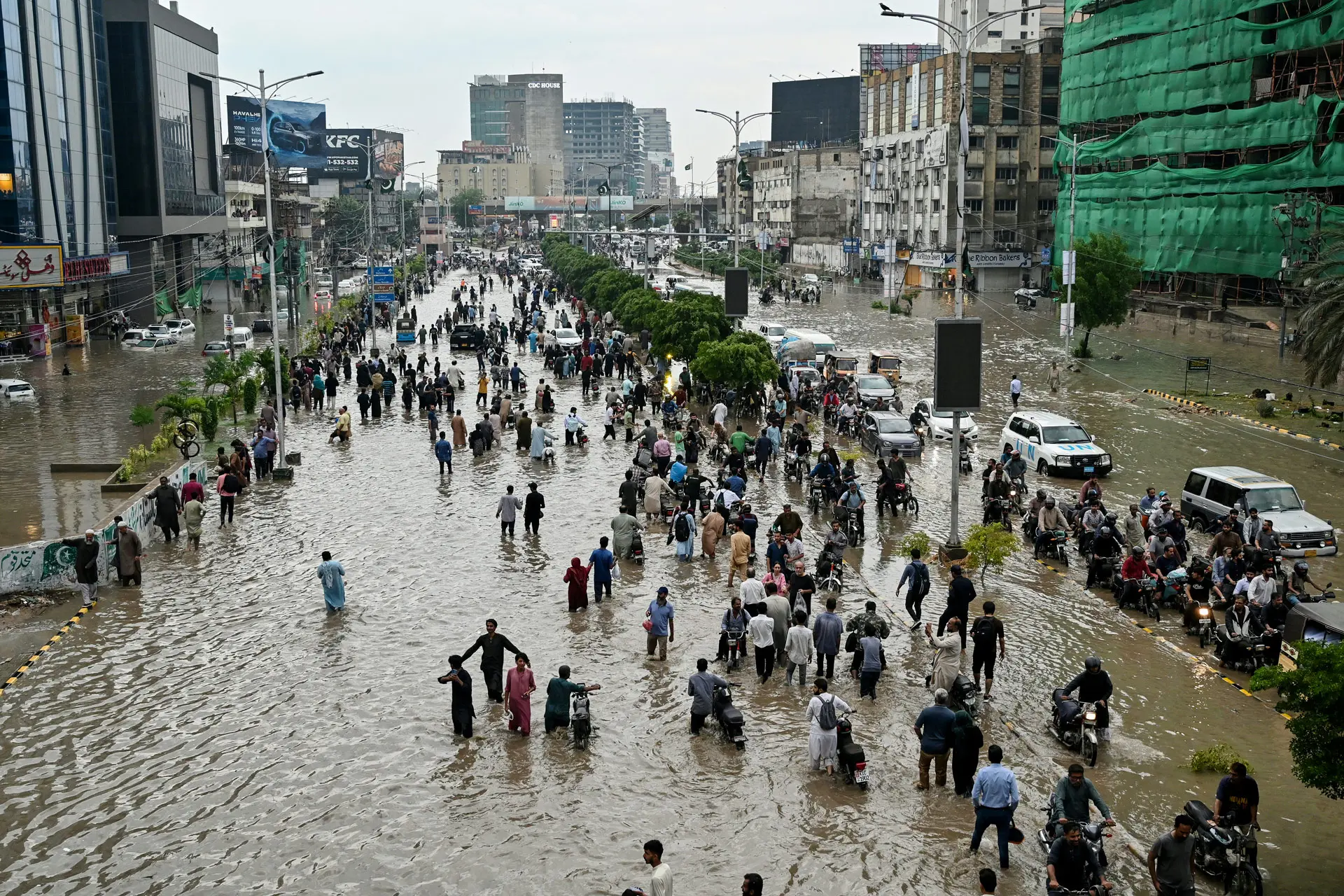
Storms flood Karachi, Pakistan, in August 2025. Torrential rains kill three times more people than during the same period in 2024. Photo: Asif Hassan/AFP
You traveled to the Amazon last year with the Planetary Guardian, an initiative involving scientists, social and political leaders, thinkers, and activists from around the world. Can you share what that experience meant to you? you?
I haven’t been able to go home to Pakistan in 11 years. I miss sitting on the floor and eating fish and eating cassava. Amazon felt like coming home for me.
At the same time, it was really heavy. Local communities were telling us about what is happening to their source of living, and I could feel the forest in pain. I don’t know how else to say this, but she is actually in so much pain.
It also ignited me in a different way. West Papua is experiencing what happened to the Yanomami people in in Brazil at a massive scale, it is being destroyed for palm oil. The Indonesian military is destroying the forest and nobody’s talking about it. I left the Amazon ignited to do work for West Papua.
Brazil will host COP 30 (30th Conference of the Parties to the United Nations Framework Convention on Climate Change) later this year. Do you plan to attend, and if so, what are your expectations for the conference?
As I’m not a United Nations Secretary-General advisor anymore, I need a reason to go. I don’t want to go just to show up. I’m really happy there’s a large Indigenous delegation.
But maybe this is offensive, but I really hope it is not a festival. I hope it’s not just random people in rooms making decisions while the rest of us perform. I hope there is protest. I hope there are challenges. I hope they understand what is at risk. So many times, these conferences happen far away from the communities. I hope it doesn’t just feed their comfort. These conferences are way too comfortable. The daily schedule of planned actions is comfortable. They’re insulated. The climate crisis feels abstract. They haven’t touched soil. I hope the COP presidency doesn’t come under the pressure of nation-states and close the negotiations too early, because that is what happened in Dubai and Egypt, when the Pacific states didn’t get to speak because they were so focused on their own agendas. I hope the presidency gives the Global North a hell of a hard time.
How does spirituality and activism intersect in your life and work?
I grew up Muslim in the United States and was bullied for it. I used to wear a hijab. My faith was always a concern, and often linked to terrorism. As an indigenous woman, that connection was even stronger. Our faith is considered dangerous.
I was terminally ill and underwent chemotherapy from age 14 to 19, and I found solace in nature. That was the only thing that healed me. I also found healing through my ancestors. My parents’ generation isn’t connected to our Indigenous heritage, which is actually dying as we speak. We’re not allowed to have our tattoos, priests, or medicine. It’s considered paganism. My grandparents’ generation did tap into that spirituality, and it healed me.
I believe in life and the preservation of life in all its forms: the forest, the oceans, indigenous peoples, and women. I believe in womanhood. Womanhood has saved me, saved the planet, and keeps saving the people around it again and again.
*German activist Luisa Neubauer, mentioned in this interview, was contacted twice by SUMAÚMA via email but did not respond.
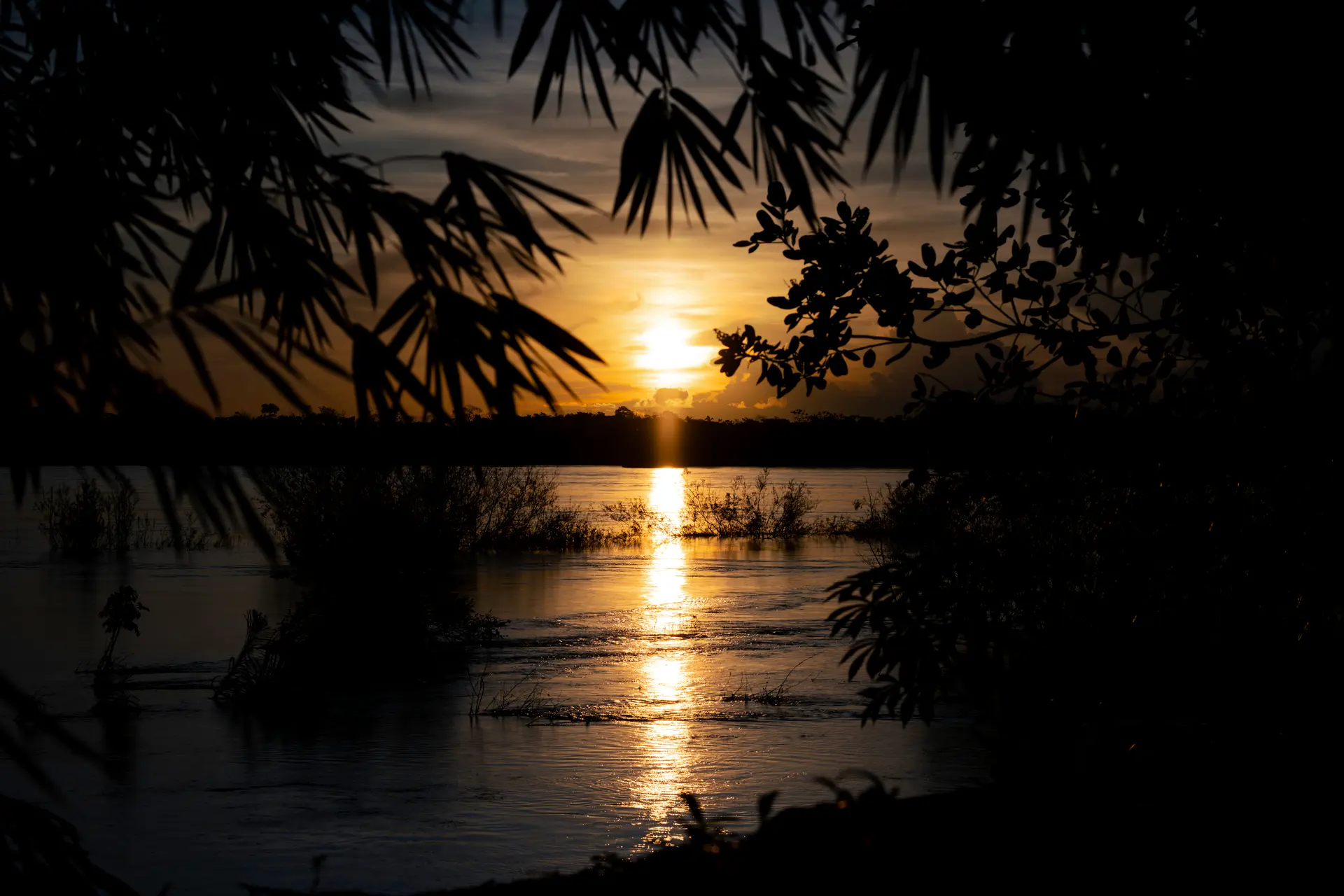
Sunset viewed from Praia Alta, on the banks of the Tocantins River in Pará, the Brazilian state that will host COP30 in the Amazon. Photo: Márcio Nagano/SUMAÚMA
Report and text: Cristiane Fontes
Editing: Eliane Brum
Art Editor: Cacao Sousa
Photo Editor: Lela Beltrão
Fact-checker: Plínio Lopes
Proofreader (Portuguese): Valquíria Della Pozza
Castilian translation: Meritxell Almarza
Copyediting and finishing: Natália Chagas
Editorial workflow: Viviane Zandonadi
Editor-in-chief: Talita Bedinelli
Editorial director: Eliane Brum

